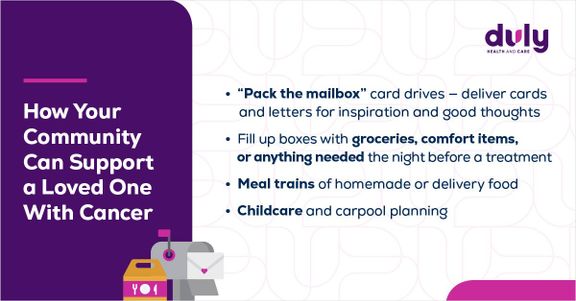You’ve gotten past the initial shock and it’s started to set in: Someone you love has cancer.
Once you have learned the basics, like the type of cancer and how they plan to treat it, it’s normal to still be filled with questions — especially about what you can do to help.
If you’re not quite sure how to start, here are 7 ways to support a loved one with cancer.
1. Be present.
This is one of the most simple things you can do, but it’s still impactful. Your loved one may feel like they’re alone or worry that relationships will change because of changes in how they look or what activities they can do, so they will appreciate knowing that you’re there for them no matter what.
Schedule a time to talk or ask when it’s generally most convenient to call. If you’re coming by for a visit, always give them a heads-up before showing up at their doorstep. And if they decide they don’t want to talk or have company, try not to be offended — sometimes, alone time is what they need most.
2. Respect Boundaries.
Listen attentively when your loved one wants to discuss their cancer, treatment, or symptoms. Equally important is respecting their choice if they prefer not to talk about their illness. Some patients feel overwhelmed by detailed questions about doctors, stages, or treatments. While offering support, be cautious not to burden them with suggestions. Initiate conversations by asking what they would like to talk about, or if they’re open to hearing about specific treatments. Adapt to their changing needs as their cancer journey unfolds, acknowledging that it may shift rapidly.
It’s natural for individuals to feel upset upon learning about a loved one’s cancer diagnosis. However, it’s crucial to manage your emotions around the patient, ensuring they don’t shoulder the responsibility of handling your grief in addition to their challenges.
3. Be specific when you offer help.
It’s not “bad” to say, “Anything you need, let me know.” But that can be a little overwhelming. At the moment, it’s not always easy to pinpoint that one thing they need — and when they do need something in the future, they may feel uncomfortable getting back in touch to ask for a favor.
Instead, offer to do something more specific, such as:
- Cooking dinner
- Doing their laundry
- Picking up their kids from school
- Going to the grocery store
- Caring for their pet, even if it’s just cleaning the cat’s litter box while you’re already visiting
It’s often hard for people with cancer to ask for or accept help, but giving them specific options might take a little pressure off and make it a bit easier.
4. Ask them what they want for dinner.
Before dropping off a lasagna or cookie tray, ask them if there is something specific they want — or don’t want. Their treatments may be causing side effects like nausea or changing their sense of taste or smell, so the foods they loved before might not seem quite so appetizing anymore.
If they don’t have a preference, consider getting them a gift card for a meal delivery service so they have a wide variety of options and can get it whenever they’re feeling up to eating.
For questions about cancer diagnosis, treatment, and support, reach out to our Integrated Oncology Program.
5. Help them maintain a sense of normalcy.
Whether it’s from the treatment, the emotions, or the cancer itself, your loved one might not be able to do the same activities right now. Whenever possible, help them keep up with their normal routines. For example:
- If they love exercise but are too tired to go on their daily runs, go on walks with them and keep up with their pace.
- If you used to go to the movies together every Friday night but now they’re avoiding going out, bring movie night to them.
- If they like to cook dinner every night but find it too tiring, find out what they want to make. Chop up and prepare ingredients ahead of time so they can cut down on the time it takes to cook. Or, cook with them and give them the tasks they can do easily while sitting.
No matter the activity, always be sure to balance encouraging them with not pushing them or making them feel guilty if they can’t or don’t want to do something.
6. Get others involved.
Quick caveat: As fun as it can be to surprise someone, make sure that your loved one has given their full support. They may want to keep their diagnosis private, or they may not want the extra attention.
There are plenty of creative ways to get others involved once you have your loved one’s blessing, and they range from being as simple as having people send cards or organizing a race to raise money for treatment. Look around online and in support groups on social media, and you will see many ways in which communities have rallied behind the people they love.

Make sure your loved one knows that they don’t just have you — they have a whole community behind them.
7. Don’t forget about caregivers — and that includes yourself.
Caring for a loved one with cancer can become a full-time job, and caregivers often neglect their own mental and physical health during that time. But when it comes to caregiving, it’s a “you can’t care for someone else if you don’t care for yourself, first” situation. Practicing self-care and concentrating on your own health doesn’t just keep your health in check — it also benefits the person you’re caring for.
If you aren’t the primary caregiver, some ways you can help your loved one’s caregiver focus on their own needs and decrease their stress include:
- Plan for a long visit rather than a quick drop-in so that their caregiver gets more time off for their own care.
- If you’re bringing over food, remember to pick up some for the caregiver, too.
- When coming over, bring your own snacks so that you don’t impose on the caregiver.
- Offer to run errands for the caregiver that they can’t do while caring for your loved one.
- Give emotional support and show your appreciation.
- Remind them of the importance of self-care if they express feeling guilty about taking time for themselves.
Watching someone you love go through cancer treatment can take a toll on your health and well-being. If you’re struggling, remember that you can always reach out to a behavioral health specialist like a therapist or counselor. When your needs are met — whether you’re a caregiver, family member, or friend — you will be better equipped to give your loved one the care they need.
Health Topics:








